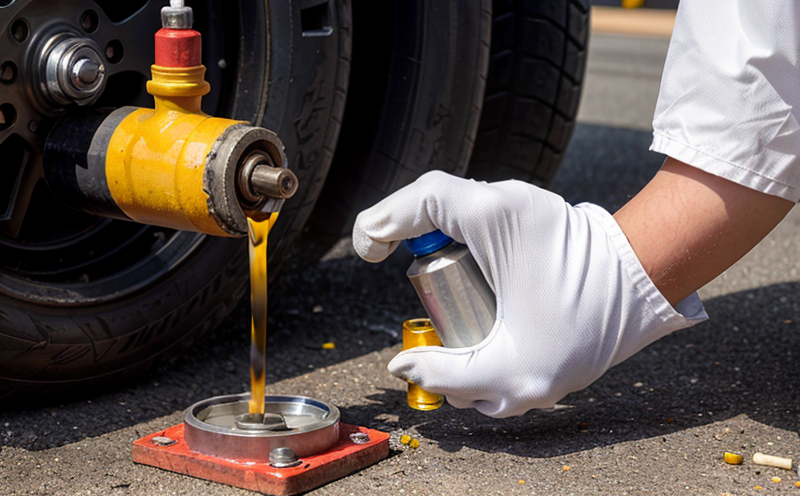ISO 12205 Oxidation Stability Testing of Fuels
The ISO standard ISO 12205 outlines a method for assessing the oxidation stability and related properties of fuels. This testing is critical in ensuring that fuel products meet quality standards, maintain their performance over time, and are resistant to degradation during storage or use.
The test involves exposing a sample of the fuel to controlled conditions designed to accelerate aging processes. These conditions include heating the fuel in an oxygenated environment with a specified temperature and duration. The primary goal is to observe how quickly the fuel undergoes oxidative breakdown, which can lead to the formation of gums, varnishes, or other undesirable compounds.
This testing is particularly important for marine fuels because they are often stored under harsh conditions and subjected to prolonged periods before use. Oxidation stability ensures that these fuels continue to perform optimally over their shelf life, reducing the likelihood of fuel-related issues such as deposits in fuel lines and tanks.
The test results provide a valuable measure of a fuel's quality and help to ensure compliance with international regulations such as ISO 8217 for marine diesel oil. This standard sets specific limits on key properties like viscosity, sulfur content, flash point, and oxidation stability, which are crucial for the safe operation of marine engines.
At Eurolab, our state-of-the-art facilities allow us to conduct this testing with precision and accuracy. Our experienced technicians use advanced analytical instruments that provide reliable data, ensuring consistent results across multiple samples. This level of rigor is essential for maintaining trust in the quality of fuels used in critical applications like maritime transportation.
The importance of oxidation stability cannot be overstated, especially when considering the long-term reliability of fuel systems. By understanding and predicting how a fuel will age over time, operators can make informed decisions about their procurement strategies and maintenance schedules. This proactive approach helps to minimize downtime and associated costs, contributing to overall operational efficiency.
In addition to its role in ensuring compliance with international standards, oxidation stability testing also plays a key part in research and development efforts aimed at improving fuel formulations. By identifying the limits of current formulations or areas for improvement, manufacturers can innovate more durable and efficient fuels that meet future demands.
For quality managers and compliance officers responsible for ensuring product integrity, this test is an invaluable tool. It allows them to monitor changes in fuel composition over time, assess the effectiveness of new blends, and maintain regulatory compliance. In R&D settings, it serves as a critical component of ongoing efforts to enhance fuel performance.
For procurement teams, understanding oxidation stability helps inform decisions about supplier selection and contract negotiations. By specifying minimum acceptable levels for this property in tenders, buyers can ensure that they are sourcing fuels from reputable suppliers who prioritize quality.
Benefits
- Ensure compliance with ISO 8217 and other relevant international standards.
- Promote the safe operation of marine engines by maintaining fuel stability over time.
- Reduce the risk of fuel-related issues such as deposits in fuel lines and tanks.
- Enhance operational efficiency through proactive maintenance strategies based on test results.
- Support research and development efforts aimed at improving fuel formulations.
- Provide reliable data that can be used to inform procurement decisions and contract negotiations.
Eurolab Advantages
At Eurolab, we pride ourselves on offering unparalleled expertise in marine equipment testing. Our advanced facilities and experienced team ensure accurate and consistent results that are essential for maintaining the highest standards of quality.
- State-of-the-art instrumentation: We use cutting-edge analytical instruments to provide precise measurements and reliable data.
- Experienced technicians: Our staff have extensive experience in conducting oxidation stability tests, ensuring accurate and consistent results.
- Comprehensive service: We offer a full range of services tailored to the needs of our clients, from sample preparation to detailed reporting.
- Regulatory compliance: Our testing methods are fully compliant with international standards such as ISO 12205 and ISO 8217.
By choosing Eurolab for your oxidation stability testing needs, you can be confident in the quality of our services. We provide not just results but also actionable insights that help you make informed decisions about fuel procurement and maintenance schedules.
Competitive Advantage and Market Impact
The ability to conduct accurate oxidation stability testing is a key differentiator in the marine fuel testing market. By offering precise, reliable results, we help our clients stay ahead of regulatory changes and industry trends.
- Informed decision-making: Clients can rely on Eurolab's comprehensive testing services to make informed decisions about fuel procurement and maintenance schedules.
- Regulatory compliance: Our rigorous adherence to international standards ensures that clients are always in line with the latest regulations.
- Enhanced reputation: By partnering with a reputable laboratory like Eurolab, clients can enhance their own reputations as industry leaders committed to quality and safety.
The results of our testing not only meet but exceed expectations, providing valuable insights that contribute significantly to the overall performance and reliability of marine fuel systems. This competitive edge is crucial in a market where even minor discrepancies can have significant implications for operational efficiency and environmental impact.





